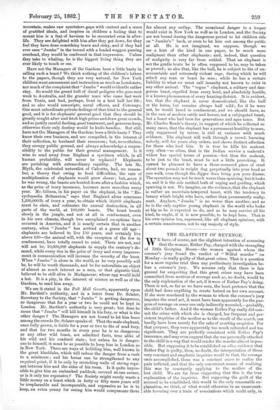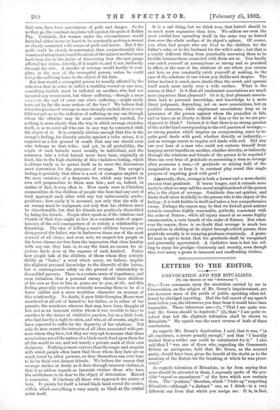THE ELASTICITY OF REVENGE.
WE have, of course, not the slightest intention of assuming that the woman, Esther Pay, charged with the strangling of little Georgina Moore—the woman against whom the coroner's jury found the verdict of " Wilful murder" on Monday—is really guilty of that great crime. That is a question for a more regular trial than any preliminary investigation be- fore a coroner's jury. We assume only that there is fair ground for suspecting that this great crime may have been committed from motives of revenge such as, no doubt, would be the only explanation of the act, if it were of Esther Pay's doing.
There is not, so far as we have seen, the least pretence that the child had done anything to create hatred on her own account.
If she were murdered by the woman to whom the coroner's jury imputes the cruel act, it must have been apparently for the pur- pose of revenge on some one only indirectly wounded,—probably,
the child's father. And if the woman Esther Pay really did com- mit the crime with which she is charged, her frequent and per- sistent inquiries of the mother as to the result of the search, can hardly have been merely for the sake of averting suspicion. For that purpose, they were apparently too much reiterated and too significant. They are perfectly consistent with Esther Pay's innocence, and may even suggest that she was personally attached to the child in a way that would render the murder almost impos- sible. But supposing it to be established on other evidence that Esther Pay is guilty, then, no doubt, the interpretation of those very constant and emphatic inquiries would be that, the revenge once accomplished, there was a constant crave to realise the pain inflicted, and that the only convenient means of realising this was by constantly applying to the mother of the lost child. We are far from suggesting that this is the true explanation of the inquiries. But supposing the guilt of the accused to be established, this would be the only reasonable ex- planation, we think, of what would otherwise be an unaccount- able hovering over a train of associations which could only, in
that case, have been associations of guilt and danger. So far as they go, the constant inquiries tell against the guilt of Esther Pay. Certainly, few women under the circumstances would have had either nerve or heart to be constantly probing a wound so closely connected with scenes of guilt and terror. But if the guilt could be clearly demonstrated, then unquestionably this unnatural attraction toward the abode of the injured mother must have been due to the desire of discovering how the new pangs affected her victim, directly, if it might be, and if not, indirectly through the wife. A murder of revenge would hardly be com- plete, in the eyes of the revengeful person, unless he could bring the suffering home to the object of his hate.
But bow would a revengeful person be usually affected by the reflection that in order to inflict a rankling wound on one man, something terrible must be inflicted on another, who had not incurred any resentment, but whose suffering,—though a mere lneans to the end of some one else's suffering,—might easily turn out by far the more serious of the two ?' We believe that when the passion of revenge is once strongly excited, there is very little scruple as to the infliction of suffering on any one through whom the offender may be most conveniently reached, for nothing is more elastic than the way in which revenge stretches itself, so as to cover all who can in any way be connected with the object of it. It is certainly obvious enough that this is the savage's feeling, for directly enmity against a tribe arises, it is regarded as a fair ground of wrath that any one should exist who belongs to that tribe; and yet, in all probability, the origin of such hatreds must usually be individual, and the extension into a tribal hatred must have been, originally at least, due to the high elasticity of this vindictive feeling, which is always ready so to spread itself as to cover the dimensions most convenient for the purposes of revenge. The savage's feeling is probably that there is a sort of contagion implied in the mere existence of a desperate foe, which may impart his own evil propensities to those near him ; and so, indeed, in matter of fact, it very often is. How rarely even in Christian communities do the children of people who have had any sort of feud approach each other with any but unfavourable predis- positions ; how easily it is assumed, not only that the wife of an enemy must be malignant, not only that his children must be objectionable, but that his friends are positively discredited by being his friends. People often speak as if the relations and friends of their foes ought to live in a constant state of appre- hension of the evil consequences of so unholy a relationship or friendship. The idea of killing a man's children because you disapproved the father, was in barbarous times one of the most natural of all ideas ; and even now, we suspect few people in the lower classes are free from the impression that close kinship with any one they hate is, to say the least, an excuse for in- jurious deeds done at the expense of such kindred. Notice how people talk of the children of those whom they actively dislike as "brats," a word which never, we believe, implies the slightest personal knowledge to the discredit of. the bairns, but is contemptuous solely on the ground of relationship to discredited parents. There is a certain sense of impatience, and even irritation, that a personal enemy should have children of his own as dear to him as yours are to you, at all ; and this feeling generally results in seriously assuming them to be of a lower calibre and a more worthless character on account of this relationship. No doubt, if poor little Georgina Moore were murdered at all out of hatred to her father, or to either of her parents, the murderer, whoever that may have been, thought of her, not as an innocent victim whom it was terrible to have to sacrifice to the claims of vindictive passion, bat as a little brat, who had hardly a right to exist, and who, at all events, ought to have expected to suffer for the depravity of her relations. Not ouly do men resent the intrusion of all ideas associated with per- sons whom they hate, but they are very apt to assume that those associations are of the nature of a black-mark fixed upon them for all the world to see, and not merely a private mark of their own disfavour. Nothing is more curious than the anger and surprise with which people often learn that those whom they hate are as mach loved by other persons, as they themselves can ever hope to be by their own dearest friends. We believe the reason that revenge strikes so freely as it does through innocent victims, is that it so seldom regards as innocent victims those who have the misfortune to be dear to the object of detestation. Hatred is expansive. It blackens all those who approach the centre of hate. It paints for itself a broad black band round the centre, within which everything is very nearly as black as the central point itself. It is a sad thing, but we think true, that hatred should be so much more expansive than love. We seldom see even the most cordial love spreading itself in the same way as hatred does over the whole surface of its object's sphere. Of course, you often find people who are kind to the children for the father's sake, or to the husband for the wife's sake ; but that is a totally different thing from practically assuming them to be lovable, because those connected with them are so. You hardly ever catch yourself at assumptions so strong and so practical in effect, in the case of the relations of one whom you esteem and love, as you constantly catch yourself at making, in the case of the relations of one whom you dislike and despise. The bitter instinct is much more elastic than the sweet, and spreads itself much more easily over a wide surface. What is the reason of this ? Is it that all unpleasant associations are much more imperious than pleasant P Or is it, that pleasant associa- tions lead to personal knowledge, and knowledge to a more direct judgment, depending, not on mere associations, but on positive character, while unpleasant associations keep us in ignorance of the person against whom the prejudice is felt, and so leave us at liberty to think of him or her as we are pre- disposed to think ? Certain it is that there is no strong passion of the nobler kind corresponding to the evil passion of revenge,— no strong passion which inspires an overpowering crave to re- quite good deeds with good, whether directly or indirectly,— just as revenge craves to requite evil deeds with evil. Did any one ever hear of a man who could not restrain himself from heaping secret benefits on another, whether directly, or indirectly through the relations and friends of the person to be requited ? Does one ever hear of gratitude so possessing a man as revenge often possesses a man,—of gratitude so seizing hold of the imagination as to keep it in constant play round this single purpose of requiting good with good ?
Apparently, then, revenge is both a keener and a more elastic passion than gratitude. It burns longer, and it extends more easily to what we may call the moral neighbourhood of the person who is the object of revenge. Gratitude dies out quicker, and limits itself more decidedly to the person who is the object of the feeling ; it is both feebler in itself and takes a less comprehensive sweep. Perhaps the reason may be that we find all good actions towards ourselves highly reasonable, perfectly consistent with the order of Nature ; while all injury aimed at us seems highly unreasonable, a rude breach of the order of Nature. But what- ever the reason, there is no doubt that revenge is much less scrupulous in striking at its object through a third person, than gratitude usually is in repaying goodness vicariously. A grate- ful man is apt to insist that his gratitude shall be recognised and personally appreciated. A vindictive man is but too wil- ling to repay his grudges vicariously and secretly, even though they cost many a groan to innocent and uuoffending victims.



































 Previous page
Previous page